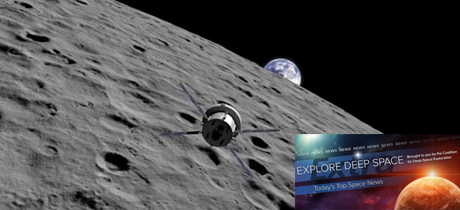In Today’s Deep Space Extra… NASA and the White House stick with uncrewed option for Exploration Mission-1, the first joint test flight of the Space Launch System and Orion crew capsule, in order to address technical challenges and avoid extra cost.
Human Deep Space Exploration
First SLS/Orion Launch Slips to 2019, No Crew
Space Policy Online (5/12): After a two month assessment, NASA says it will not attempt to fly astronauts on the first joint test flight of the Space Launch System rocket and Orion crew capsule. An Exploration Mission-1 flight with two astronauts would not have been possible until 2020 and would cost an additional $600 million to $900 million. EM-1, even uncrewed, will slip from late 2018 into 2019. The launch of the uncrewed EM-1 will determine the date for EM-2, which will include astronauts launched on a journey around the moon and back to Earth.
Mars Advocates Emphasize Policy Continuity Over Uncertainty
Space News (5/12): Speaking at the fifth annual Human to Mars Summit in Washington last week, NASA acting administrator Robert Lightfoot said his agency is committed to a “horizon goal” of exploring Mars with humans, with an initial launch in 2033. “The current administration and the current Congress is very supportive, I think, of this goal,” said Lightfoot.
This Company Plans to Mine the Moon and It’s Not Alone
Space.com (5/13): Florida-based Moon Express plans to return a scoop of lunar soil to the Earth as part of a commercial venture in 2020. The company is not the only commercial or national venture intent on identifying resources on the moon and near Earth asteroids, like water and platinum metals, that would have value to investors.
Space Science
Antiproton Count Hints at Dark Matter Annihilation
Science News (5/11): Detections of antiprotons by the Alpha Magnetic Spectrometer, an astronomical observatory attached to the outside of the International Space Station, hint at the nature of dark matter and its destruction. An assessment from scientists in Germany, China and Taiwan appears in the May 12 edition of Physical Review Letters.
Spitzer Space Telescope Passes 5,000 Days in Space
Space.com (5/12): Spitzer, one of NASA’s Great Observatories, logged its 5,000th day of space operations on May 3. Spitzer, which observes in the infrared region of the light spectrum, was launched in 2003. Some observations are focused on nearby stars with planets.
Students Launch Rockets, Maybe Careers, at South Pier
USA Today (5/14): Spaceport Sheybogan, of Wisconsin, hosted annual Rockets for Schools activities on Saturday. “What I’m hoping is that a lot of you will decide to go into the sciences as a career field,” Winston Scott, a former NASA astronaut who went on missions in 1996 and 1997, told the middle and high school students Saturday.
Low Earth Orbit
Astronauts Complete Shortened Spacewalk Outside International Space Station
Spaceflightnow.com (5/12): Airlock difficulties forced International Space Station commander Peggy Whitson and fellow NASA astronaut Jack Fischer to abbreviate an otherwise successful spacewalk on Friday, the 200th excursion focused on the assembly and maintenance of the orbiting science lab. The duo replaced an external avionics box and installed diagnostic electronics on a space observatory known as the Alpha Magnetic Spectrometer.
Russia May Deliver Research Module to Space Station in 2018
TASS (5/12): Russia’s long-delayed Nauka Multi-purpose Laboratory Module will not be launched to the International Space Station before August 2018, according to Russian aerospace industry sources. Last year, Russia announced it was reducing from three to two the number of cosmonauts assigned to the space station until the MLM is launched in order to reduce costs.
The Week Ahead
What’s Happening in Space Policy May 15-19, 2017
Space Policy Online (5/14): Washington’s Newseum will host the program “On the Launchpad: Return to Deep Space” on Tuesday, 5/16, from 1 p.m. to 5 p.m. EDT. The program will feature remarks from NASA Acting Administrator Robert Lightfoot; U.S. Senator Ted Cruz, chair of the Senate Commerce space subcommittee; former NASA chief scientist Ellen Stofan; Bob Zubrin, of the Mars Society; Chris Carberry, of Explore Mars; Mary Lynne Dittmar, of the Coalition for Deep Space Exploration; and former NASA astronaut Michael Lopez-Alegria. The program will be webcast.

